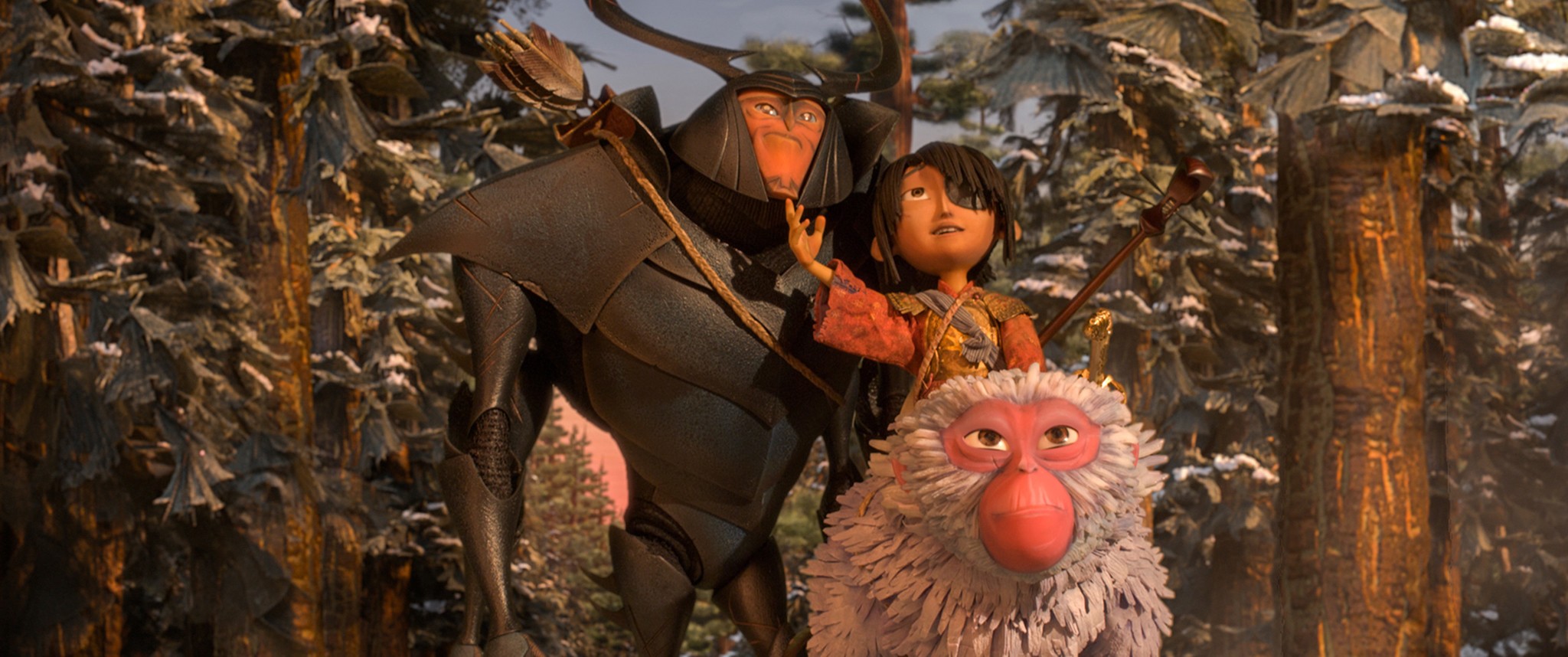I have a very broad spectrum of movies that I enjoy. I love grade=A studio flicks, retro B movies like “Clash of the Titans” and “Monster Squad” and even dabble in obscure C flicks from odd and strange dimensions of cinema that at one point I had no idea even existed. There are also plenty of films that I completely loathe as well, hating with a firmly planted revulsion and disgust that the very existence of such is a bane to my own (I regret every second I wasted watching “Transformers 2”). But then, there is another spectrum, a stratospheric level of good film that I enjoyed so much that without a doubt I could say it would be in my top-100 films of all time, and that if I had to pick only those movies to watch for the rest of my life, these examples of great filmmaking makes my life feel just a sliver more complete. Last year “Mad Max: Fury Road” was one of those movies, and this year it’s “Kubo and the Two Strings.”
The fourth film by Oregon-based animation studio Laika, who made stop-motion animated classics “ParaNorman” and “Coraline,” have made its greatest picture yet. Animated with the practically lost art of stop-motion animation, the world of Kubo hooks you like a fish and reels you in wondrously, with an opening of a lone woman drifting on a tiny boat through an ocean in a storm, parting a massive tidal wave with the stroke of her magical three string shamisen as Kubo narrates solemnly.
The story does not follow her, but her baby boy that she shelters on her back through the maelstrom. The one-eyed Kubo grows to adolescence, the young son of a legendary fallen samurai who takes care of the ill mother who sheltered him through the storm. During the days, he earns money telling tales of his father to the village beyond the sea cliffs with his instrument, and at night he takes shelter in his cave home, enjoying what time he has left with his slowly fading mother.
The past actions of his father are why Kubo and his mother now hide on this secluded Japanese coast from Kubo’s grandfather, a mystical and vengeful deity known as the Moon King. Also in chase are Kubo’s two horrifyingly creepy aunts, who resemble Japanese witches, and wonderfully voiced by Rooney Mara, who gives these creepy antagonists such horrifying life that I couldn’t wait for them to show up again. When they find Kubo, the pursuit is on and his journey begins to find his father’s mystical armor and sword to protect himself, along with a mysterious monkey (named Monkey) greatly voiced by Charlize Theron,
Theron is just awesome in everything she does, and her voice work here is top-notch with a tone of motherly authority and devotion to aiding Kubo’s quest. Kubo is also joined by the oddly goofy and over-sized Beetle (who, you guessed it, is a beetle) voiced by Matthew McConaughey, who steals the show as the amnesiac beetle who claims to be a former warrior (he thinks) who fought alongside Kubo’s father (he’s pretty sure). Beetle is odd and hilarious, with his backward way of doing things, but also heartfelt wisdom. I am convinced at this point in history that McConaughey should be named a national treasure. Art Patkinson (Rickon Stark in “Game of Thrones”) gets the last, not least, and truly deserving nod as the soulful, fun, strong and lovable Kubo, who is a hero you’ll adore and truly root for from his playful nature to his dauntless heart.
The absolute best parts about this movie are the fantastic story that should be the stuff of animation legend and, in my opinion, is up there with the likes of Disney’s “Beauty and the Beast” and “The Lion King.” “Kubo and the Two Strings” is perfectly told by its incredibly and intricately simple Japanese aesthetic, beautifully brought to life by the devoted and caring animators at Laika. Kubo’s story is an example of the reason I got into writing, with a script and tale that is near perfect. It is my hope that one day in the far off future, I may be able to write a story almost as good as the tale of “Kubo and the Two Strings.”
Please stay for the credits to hear Regina Spektor’s great cover of the Beatles classic “While My Guitar Gently Weeps,” to see some more of the fantastic animation, and a to get a behind-the-scenes glimpse at the incredibly detailed and mind-blowing process of bringing this movie to life. The credits are just as much a part of the movie as any other scene and are equally as engrossing. Definitely go see it, as I can’t even imagine you’ll be disappointed.
“Kubo and the Two Strings” is currently playing at the Riverside Cinemas, 1017 S. Boone St. in Aberdeen.
George Haerle is a 2008 graduate of Aberdeen High School. He holds a bachelor’s degree in creative writing for media and lives inCosmopolis.


